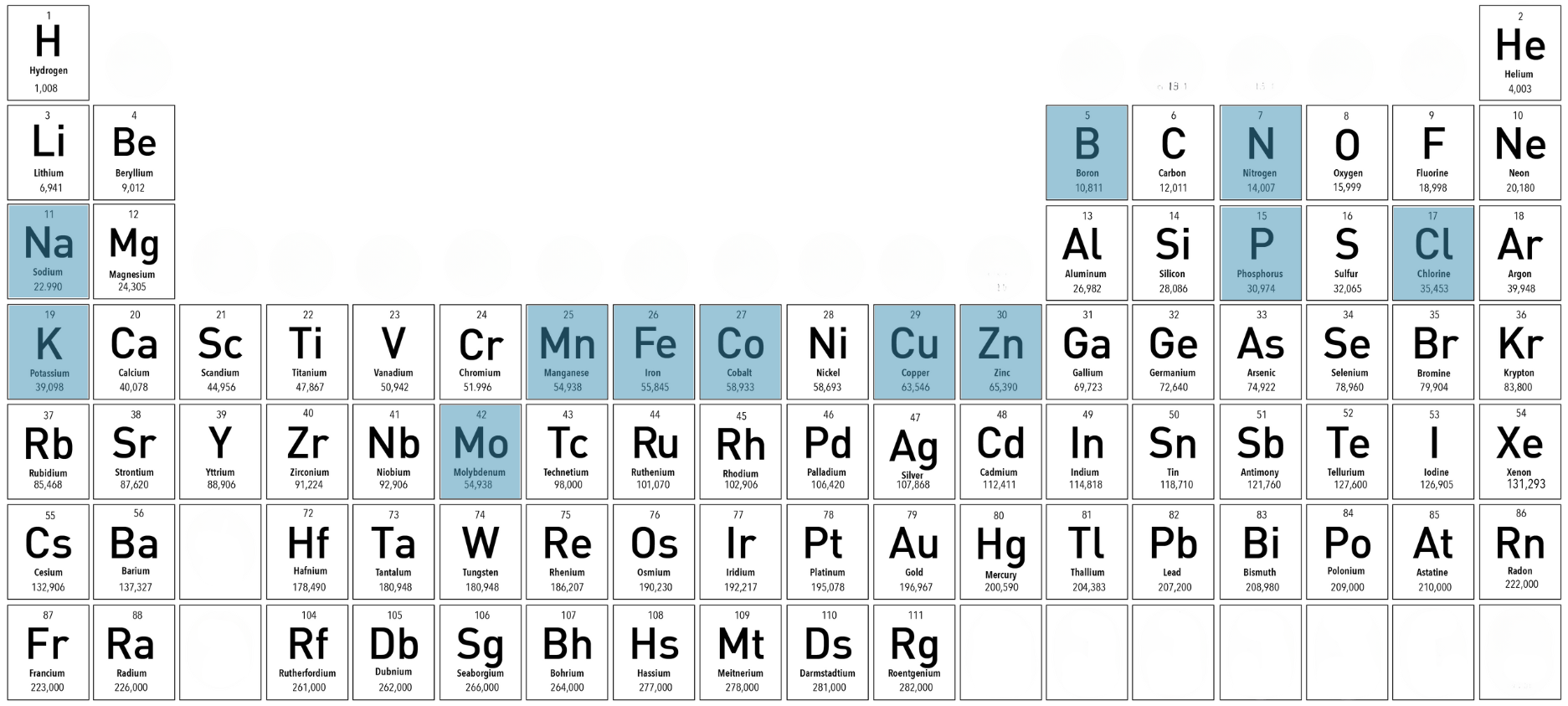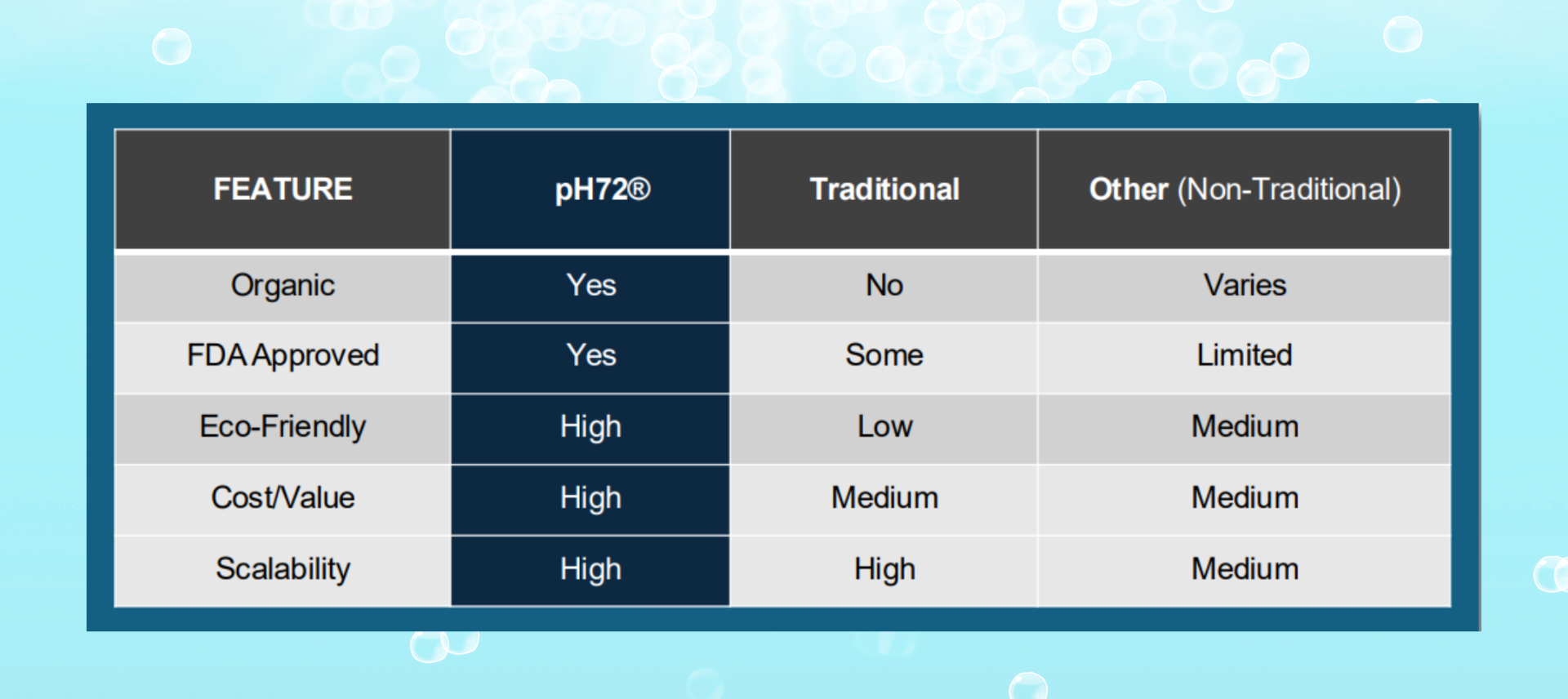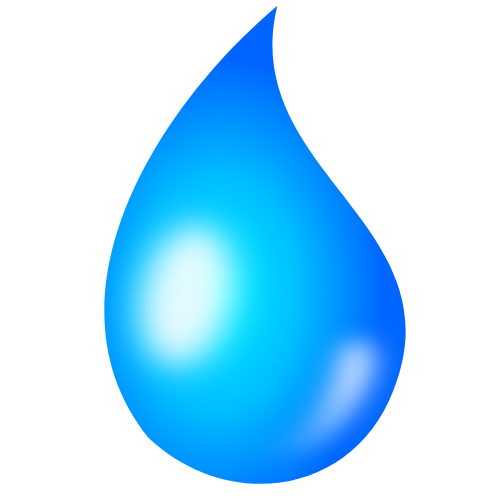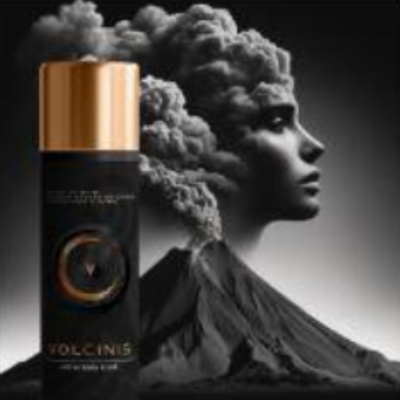
Innovative and Sustainable Solutions
Volcanic Rock
"Like Nothing Else on Earth"
WASTEWATER REMEDIATION GAME CHANGER
pH72® is a naturally occurring volcanic rock that is chemical-free, balancing pH levels and eliminating the need for dichlorination, thus providing sustainable wastewater discharge solutions.
Sourced from a rare 300-year-old volcanic deposit, pH72® enriches farmlands and aquatic ecosystems with 72 vital minerals, enhancing crop yields and benefiting aquatic life.
Validated by industry leaders, pH72® sets a new standard for responsible water treatment, aiming to be a transformative force by leveraging the natural abundance.
DOWNSIDES OF STANDARD CHEMICAL TREATMENTS
Common wastewater treatment methods rely on chemicals, which, while effective, come with significant environmental and operational drawbacks.
Current Wastewater Treatment Methods:
- Harm to Aquatic Ecosystems
Chemical runoff can disrupt ecosystems, harming wildlife and water quality.
- Reduced Farmland Nutritional Value
Residual chemicals diminish soil fertility, impacting agricultural productivity.
- Increased Operational Costs and Inefficiencies
The use of chemicals raises costs, requires specialized handling, and often results in inefficient long-term processes.
- Chemical Residues
Disinfection chemicals leave behind harmful byproducts, like trihalomethanes (THMs), that accumulate in rivers, lakes, and oceans, disrupting aquatic ecosystems and entering the food chain.
- Algae Blooms and Oxygen Depletion
Chemical runoff creates nutrient imbalances that trigger algae blooms, which deplete oxygen levels, create dead zones, and block sunlight as they decompose, severely disrupting marine ecosystems.
- Long-Term Soil and Water Contamination
Chemical treatments contaminate soil and groundwater, degrading soil quality, disrupting the microbiome, and rendering land unsuitable for agriculture or safe drinking water.
CHALLENGES IN CHEMICAL TREATMENT OPERATIONS
Operational Challenges
Handling and applying chemicals require specialized equipment and training, which increases operational costs, poses safety risks, and heightens the potential for environmental disasters like spills.
Corrosion and Infrastructure Damage
Corrosive chemicals accelerate infrastructure degradation, leading to higher maintenance costs and more frequent repairs or replacements.
High Energy Costs
Chemical treatments require significant energy input, increasing operational carbon footprints and hindering sustainability efforts in wastewater management.

THE SOLUTION –pH72®
An environmentally friendly approach that enhances water quality, reduces costs, and supports sustainability.
- 100% organic, FDA & OMRI-approved.
- Replaces chemicals traditionally used in dichlorination.
- Enables beneficial and safe water discharge.
THE pH72® APPROACH TO WASTEWATER MANAGEMENT
pH72® offers a proven, chemical-free method to purify water and restore soil, effectively neutralizing heavy metals, PFAS, and other contaminants. By reducing environmental risks and delivering health and economic benefits, pH72® provides a forward-thinking, eco-friendly alternative to chemical-based wastewater treatments, allowing facilities to implement a natural filtration system.
Benefits:
• Protect Local Ecosystems: Prevent harmful chemical residues and pollution from affecting local environments.
• Promote Safer Operations: Minimize reliance on hazardous chemicals, reducing safety risks for operators.
• Support Sustainability: Align with environmental goals by decreasing chemical usage, carbon footprints, and water wastage.
• Enhance Water Quality: Improve water quality without introducing new environmental hazards, benefiting both human populations and natural habitats.
• No Harmful By-Products: Eliminate contaminants without adding new chemicals, preserving waterway and marine life health.
• Support Biodiversity: Maintain neutral pH levels and filter out toxins to protect aquatic life and foster a diverse, resilient ecosystem.
• Facilitate Sustainable Agriculture: Safely reuse pH72 treated water for agriculture and non-potable purposes, promoting sustainable farming and reducing pressure on natural water resources.
pH72® vs. Traditional Methods
Non-Chemical Filtration
pH72® utilizes natural properties to filter wastewater, effectively binding and removing heavy metals and pollutants without introducing harmful chemical residues.
Simplified Application and Reduced Maintenance
pH72® streamlines wastewater management by reducing maintenance costs, lowering accident risks, and prolonging the lifespan of treatment systems.
Operational Efficiency and Safety
pH72® reduces energy consumption, carbon emissions, and environmental risks, while simplifying wastewater treatment operations by minimizing manual interventions, chemical storage needs, and enhancing safety and cost-effectiveness.
Sustainable and Environmentally Friendly
pH72® reduces the environmental impact of wastewater treatment, ensuring cleaner water discharge without harmful byproducts, promoting water reuse in agriculture and industry, and conserving freshwater resources.
Improved Water Quality and pH Stability
pH72® is its natural ability to stabilize water pH levels through the 72 essential minerals, which supports aquatic life, enhances water quality, and reduces the
risk of acidification in waterways.
pH72® vs. COMPETITORS

VALIDATED PERFORMANCE
• Proprietary formulation backed by extensive research
• Positive results confirmed by global consultants
• Ongoing commitment to independent testing
NATURE’S MINERAL POWERHOUSE
Independent Test Conducted on August 12, 2024
Proven efficacy in bringing pH to the appropriate alkaline level before discharge. We concluded that treating a minimum of 340 million gallons of wastewater per day requires applying one metric ton (MT) of VR per 20 million gallons treated. Many of the facilities we consult apply between 6-15 inorganic chemicals daily. Based on this, we recommend that 25% of the chemical treatment incorporate VR to ensure complete chlorine removal from the discharge water. Throughout our enrichment process, we apply one MT of VR to each phase (primary, secondary, and tertiary) due to VR's porosity.
APPLICATION
One metric ton per 20 million gallons in the Primary, Secondary, and Tertiary stages.

Transforming Wastewater Remediation

Optimized Water Treatment
- Enhances water quality and reuse potential
- Naturally stabilizes pH, reducing chemical interventions
- Effectively removes contaminants and heavy metals

Sustainability Champion
- 100% natural composition, OMRI certified for organic use
- Significantly reduces chemical additive requirements
- Supports carbon footprint reduction initiatives

Risk Mitigation
- Reduces reputational risk through sustainable practices
- Minimizes regulatory compliance issues
- Lowers physical risk by reducing wastewater volume and pollutant load

Operational Cost Reduction
- Achieves up to 36.9% in overall cost savings
- Decreases water consumption and treatment expenses
- Improves energy efficiency in water management processes

Agricultural Efficiency Boost
- Enhances soil structure for improved water retention
- Optimizes nutrient availability and uptake
- Promotes beneficial soil microbiome

Versatile Implementation
- Seamless integration into existing agricultural operations
- Effective for industrial wastewater treatment
- Applicable in environmental remediation projects





